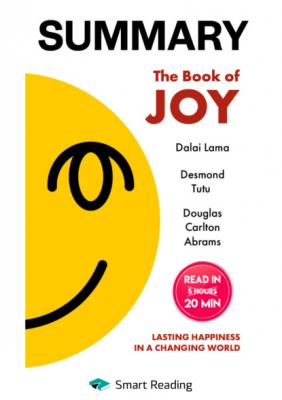Summary: The Book of Joy. Dalai Lama, Desmond Tutu, Douglas Carlton Abrams. Smart Reading
Читать онлайн.| Название | Summary: The Book of Joy. Dalai Lama, Desmond Tutu, Douglas Carlton Abrams |
|---|---|
| Автор произведения | Smart Reading |
| Жанр | Религия: прочее |
| Серия | Smart Reading: Саммари на английском языке |
| Издательство | Религия: прочее |
| Год выпуска | 2022 |
| isbn |
Fear is the body’s protective biological reaction that we need to survive. But in the modern world this mechanism is not as relevant, and often we experience exaggerated or groundless fear. And the large number of sources of stress is not as much an issue as our reaction to them[5]. Exaggerated expectations and unfulfilled ambitions only make the situation worse for us, as we fail to realize that most of our fears are just mental projections that have no real basis.
While he was explaining why most of our fears are usually groundless, His Holiness told his interlocutors that in the Potala Palace, where he lived as a child, there was a very dark room that was said to be haunted. Every time he passed by this room he constantly felt someone’s presence, when in fact no one was in there. But, it was this experience that helped the Dalai Lama to realize that fears are just projections of the mind that we pay excessive attention to. (Having listened to this story, the Archbishop jokingly said, "No! They really was someone in there!")
We also tend to think that fear and anger are independent emotions. However, the Dalai Lama claims that anger arises due to fear. For example, we want to be loved and feel angry because of our fear of not getting what we want. Anger can be caused either by physical or by mental pain, the latter being a much more frequent cause of anger. The recognition and acceptance of one’s own fears helps one to overcome anger. But at the same time, it is necessary to be ready to admit our vulnerability, which we are often ashamed of, believing that we need to be strong so that we do not feel pain. But the Archbishop emphasizes that guilt and shame only increase our negative emotions.
Конец ознакомительного фрагмента.
Текст предоставлен ООО «ЛитРес».
Прочитайте эту книгу целиком, купив полную легальную версию на ЛитРес.
Безопасно оплатить книгу можно банковской картой Visa, MasterCard, Maestro, со счета мобильного телефона, с платежного терминала, в салоне МТС или Связной, через PayPal, WebMoney, Яндекс.Деньги, QIWI Кошелек, бонусными картами или другим удобным Вам способом.
